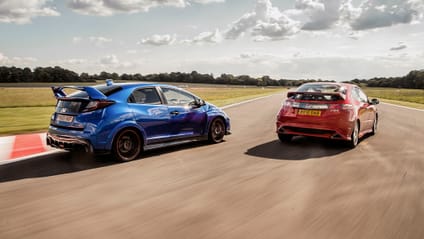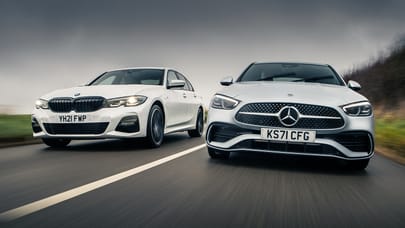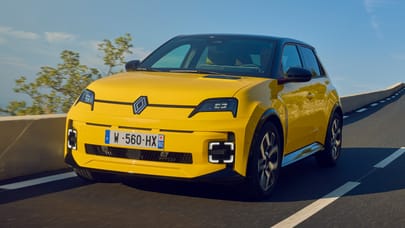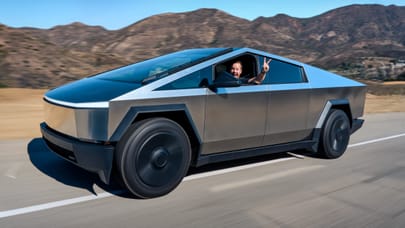
2007 Honda Civic Type R vs 2015 Honda Civic Type R
Last gen turbo Type R takes on its naturally aspirated predecessor. Who wins?


In a way, it’s surprising Honda held out for so long. When the red Civic Type-R you see here was launched back in 2007, most of its rivals were already turbocharged. Take the MkV Volkswagen Golf GTI. It had the same power as the 198bhp Civic, but over 60lb ft more than the 142lb ft the Honda could muster, delivered almost 4,000rpm further down the rev range.
Photography: Mark Riccioni
Advertisement - Page continues below
Unsurprisingly the Civic, with its engine largely carried over from the 2001 EP3 Type-R, was criticised for being off the pace. But Honda held out, trusting in VTEC and high revs to do the business. And to a certain extent it did – and still does today.

This naturally aspirated 2.0-litre is sharp and tingly. With intake and outflow of gases unimpeded, response is immediate and it’ll happily soar round to 8,500rpm – 1,500rpm beyond the upper reaches of the turbo’s range. It sounds eager and determined, with the engine building to a climax at the top end. If you’re prepared to whip it along, it’s great.
Advertisement - Page continues below
But the overriding impression is of a car that delivers much noise and drama for little progress. That’s not a criticism that can be levelled at the new one. The step-up in performance between the two generations is easily the biggest here – over 50 per cent more power, over 100 per cent more torque. Put your foot down at 30mph in fourth gear, and 10.7 seconds later you’ll have passed 100mph. The old Civic won’t be along for another eight seconds.

But the initial lunge, that moment when you go for an overtake, there’s a lot less between the two. The 2015 Civic suffers from considerable turbo lag. Side by side at 25mph on Dunsfold’s runway, old kept new honest for a four count before the turbo hooked up and thrust the monstrously winged Civic into the distance. At higher revs the issue is smaller, but it’s clear Honda still has work to do to perfect turbocharging.

There is noise, but it’s flat and bland, lacks tonal definition or the sense that it’s working hard. The Civic’s blower is monoscroll, which means the impeller blades are fixed rather than having the variable geometry that allows carmakers to tune engine response and torque delivery via the turbos as well as the motor.

Since the turbo behaves the same across the rev range, it allows you to feel some of the four-cylinder’s power characteristics, not least the step in performance when the VTEC kicks in. Turbos, especially variable-geometry ones, have a tendency to smother not just noise, but character – it’s one of our chief blower bugbears.
Advertisement - Page continues below
But because you don’t have to rev the knackers out of the new one to get places, economy is pleasingly strong – we had a long-term car and it averaged 35mpg, where the old one returns around 28mpg. In saved cost and gained range that’s a difference worth having.

As is the power and speed. This is relatively simple first-generation turbocharging, and there’s a certain charm to its lag and heavy punch – the turbo Civic feels raw but rewarding. Yes, it’s missing the top-end snap and snarl, the aural pleasure, but of the two, old and new, it’s the one to have.
Advertisement - Page continues below
2007 Honda Civic Type R
Engine: in-line 1998cc 4cyl
Power: 198bhp @ 7800rpm
Torque: 142lb ft @ 5600rpm
0–62mph: 6.7secs
MPG/CO2: 31.0mpg – 211g/km2015 Honda Civic Type R
Engine: in-line turbocharged 1996cc 4cyl
Power: 306bhp @ 6500rpm
Torque: 295lb ft @ 2500rpm
0-62mph: 5.7secs
MPG/CO2: 38.7mpg – 170g/km
More from Top Gear
Trending this week
- Electric
Top Gear's top 20 electric cars









